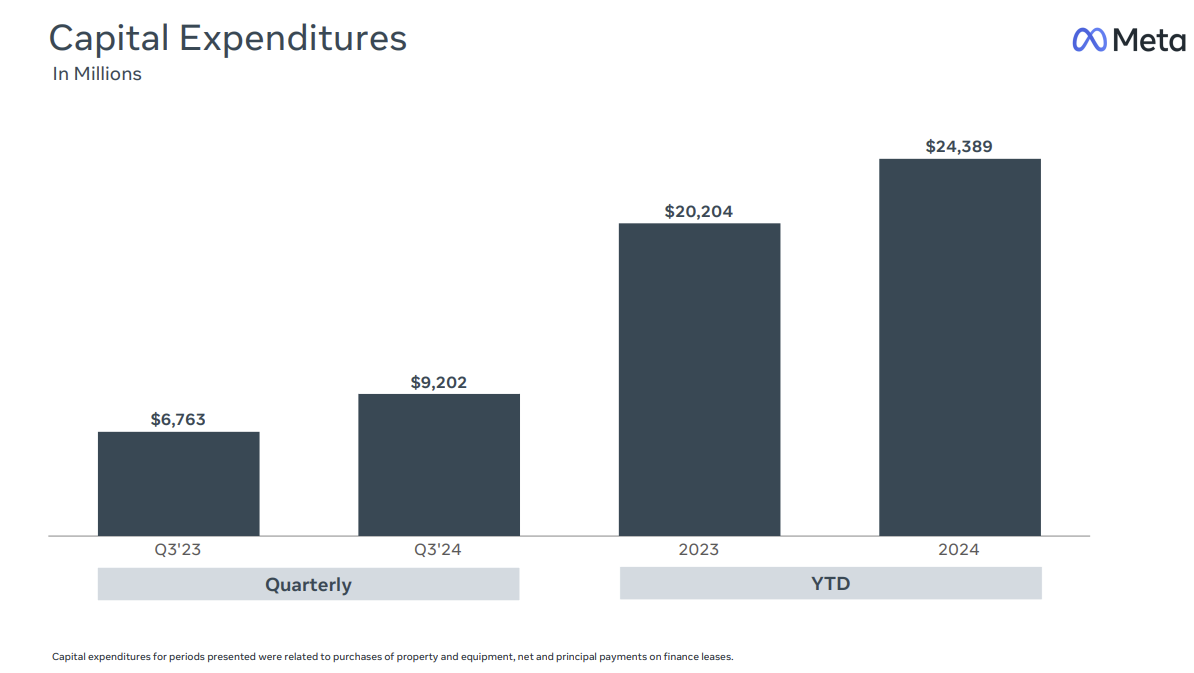Meta's 2025 budget planning process goes like this: Spend heavily on AI infrastructure and use AI to drive efficiencies so you can plow more money into GPUs.
That peak into 2025 hyperscale budgeting was delivered by Meta CEO Mark Zuckerberg. Zuckerberg was a little more direct about the spending plans on AI, but the other hyperscale giants--Microsoft, Google Cloud and Amazon--have similar plans.
Speaking on a conference call, Zuckerberg was clear that Meta's appetite for GPUs--mostly from Nvidia--will be insatiable.
He said:
"We're training the Llama 4 models on a cluster that is bigger than 100,000 H100s or bigger than anything that I've seen reported for what others are doing."
- Is AI data center buildout a case of irrational exuberance?
- Blackstone's data center portfolio swells to $70 billion amid big AI buildout bet
- The generative AI buildout, overcapacity and what history tells us
Zuckerberg added that Meta is early in the budget process, but is targeting the following: AI for efficiency that will partly fund more investment in infrastructure.
1. AI for efficiency. "First, it's clear that there are a lot of new opportunities to use new AI advances to accelerate our core business that should have strong ROI over the next few years, so I think we should invest more there," said Zuckerberg.
Meta's third quarter results were powered by monetization efficiency due to AI. Meta is also boosting engagement and optimizing ad delivery. The company delivered third quarter revenue of $40.59 billion with net income of $15.69 billion, or $6.03 a share. Meta's results were well ahead of Wall Street estimates.
As for the outlook, Meta projected fourth quarter revenue of $45 billion to $48 billion.
CFO Susan Li noted that Meta can boost productivity with AI as it optimizes monetization.
"On the use of AI and employee productivity, it's certainly something that we're very excited about. I don't know if we have anything particularly quantitative that we're sharing right now. I think there are different efficiency opportunities with AI that we've been focused on in terms of where we can reduce costs over time and generate savings through increasing internal productivity in areas like coding."
She said content moderation is another area where AI can boost productivity. Large language models (LLMs) will also improve multiple work streams in general and administrative categories. Li said that Meta also has a headcount opportunities too.
2. Investment in AI infrastructure. "Our AI investments continue to require serious infrastructure, and I expect to continue investing significantly there too," he said.

Specifically, Meta projected 2024 capital expenditures to be $38 billion to $40 billion, updated from the $37 billion to $40 billion range. The company now expects "a significant acceleration in infrastructure expense growth next year."
Zuckerberg, however, noted that infrastructure will become more efficient and that's why Meta has backed the Open Compute Project. He said:
"This stuff is obviously very expensive. When someone figures out a way to run this better, if they can run it 20% more effectively, then that will save us a huge amount of money. And that was sort of the experience that we had with open compute and part of why we are leaning so much into open source here."
- Meta AI upgraded with Llama 3.2 models as Meta melds AI, AR, spatial computing
- Meta launches Llama 3.1 450B and for Zuckerberg it's personal


